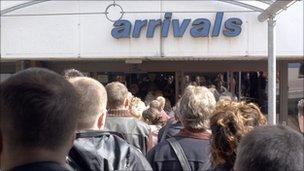Immigration from Romania and Bulgaria: Government accused of 'farcical' strategy
- Published

Ministers say keeping the controls in place would be against the law
Government efforts to deal with a possible increase in immigration from Romania and Bulgaria next year "border on the farcical," says an MP.
No 10 says it is looking at options amid MPs' concerns about the impact of temporary controls lapsing this year.
Labour MP Keith Vaz said trying to discourage people from coming to the UK would be "counterproductive".
He was responding to reports negative adverts about the UK were among suggestions being considered.
The idea potential migrants could be deterred by references to the downsides of British life, such as the amount of rain, emerged over the weekend.
Communities Secretary Eric Pickles told ITV News that the UK did not wish to portray itself as "anything other than a very pleasant place to be" but migrant workers had to have "sensible expectations" when they arrived.
The last Labour government agreed transitional controls on immigration from Bulgaria and Romania when the two countries joined the European Union in 2007, but these expire at the start of next year.
The government has said it is impossible, under EU law, to keep the limits in place any longer.
But ministers are coming under increasing pressure to act, from MPs concerned about the repercussions of any increase in arrivals for public services and commitments to cut net migration.
'Legal framework'
According to newspaper reports, Downing Street is considering restricting access to public services for future migrants, as one of a number of potential responses.
According to The Financial Times, external, options being considered included asking immigrants who had not found a job within three months or did not have necessary funds to support themselves for six months to leave.
No 10 said it was is considering all options open to it, but a spokesman stressed there was a "clear legal framework" underpinning guarantees on the free movement of people within the European Union and "we have to operate within that".
The spokesman played down suggestions Britain might try to deter Bulgarian and Romanian arrivals by launching an advertising campaign in those countries stressing the negative aspects of life in the UK, including the weather.
'Singling out'
But Mr Vaz, who is chairman of the Commons Home Affairs Select Committee, said any suggestion of spending money on "advertisements and propaganda trying to stop Romanian and Bulgarians coming to Britain borders on the farcical".
"On the one hand, the Home Office doesn't want them in but on the other hand, the minister for Europe is saying there is freedom of movement," he said.
"The government is in danger of actually encouraging more people to come."
"These kinds of tactics have been used in the past and been found to be counterproductive."
He also suggested there were divisions in government about how to deal with the issue.
Mr Vaz said the question of whether foreign workers should have guaranteed access to public services, including the NHS, should be looked at, but warned against "singling out" workers from individual countries.
"Ministers would be better off working with their Romanian and Bulgarian counterparts and the EU to address the reasons migrants want to come here in the first place."
Migration figures
Ministers have warned against "scare stories" about a potential surge in numbers. But Mr Vaz said officials had failed to come up with an estimate of the number of arrivals expected, despite repeated requests.
The think tank Migration Watch, which supports tighter immigration controls, has said about 50,000 people from Romania and Bulgaria will come to the UK each year until 2019 and that this will have "significant consequences" for housing and jobs.
The government's own migration advisory committee says there is evidence Bulgarians would move to Britain because of its stronger economy, and it is "plausible" Romanians would come for the same reasons.
Since 2007, Bulgarians and Romanians have been able to come to the UK as self-employed businessmen or women, or as students, provided they do not seek benefits or any other employment.
But the end of existing controls will give Bulgarian and Romanians who want to work in the UK the same rights as foreign nationals from the other 24 EU nations.
Speaking in the Commons on Monday, Work and Pensions Secretary Iain Duncan Smith said ministers were "utterly opposed" to European Commission proposals which he claimed would allow future migrants - including those from Bulgaria and Romania - to claim benefits on "day one" after arriving.
But a spokesman for the European Commission described the minister's claims as "total tosh" and said EU nations were not obliged to do so unless certain residency tests are met.
- Published17 January 2013
- Published9 January 2013
- Published11 November 2012